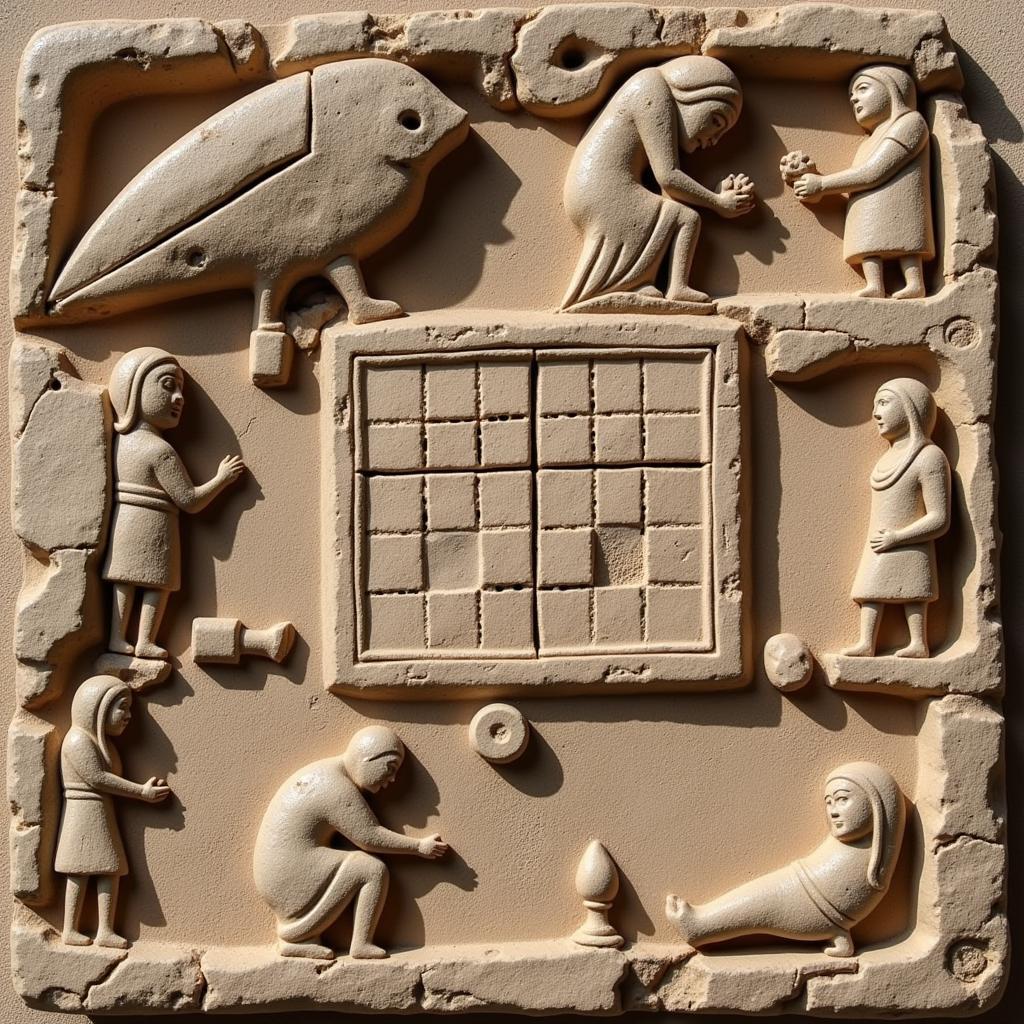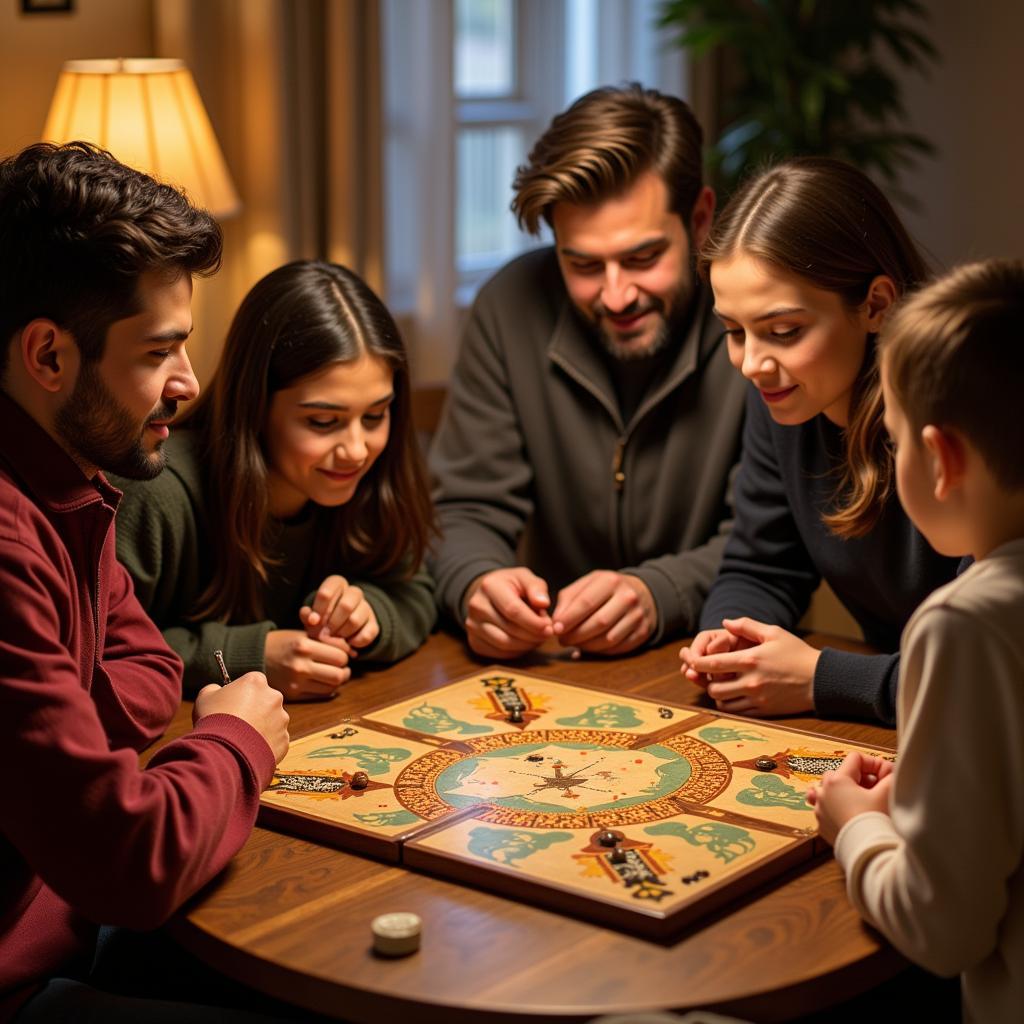Arabic Board Games offer a fascinating glimpse into the rich history and culture of the Arab world. From ancient strategy games to modern family favorites, these games provide entertainment, challenge your mind, and foster social connections. This article delves into the captivating world of Arabic board games, exploring their origins, rules, and cultural significance.
A Journey Through Time: History of Arabic Board Games
 Ancient Arabic Board Game Carvings
Ancient Arabic Board Game Carvings
For centuries, board games have held a special place in Arab culture. Some of the earliest evidence of board games can be traced back to ancient Mesopotamia and Egypt, regions with strong historical ties to the Arab world. Games like Mancala, with its simple yet strategic gameplay, have been played across Africa and the Middle East for millennia, including in many Arab countries. These early games often reflected aspects of daily life, such as trade, agriculture, and warfare. Over time, these games evolved, adapting to different cultures and societies, leading to the diverse array of Arabic board games we see today.
Popular Arabic Board Games: A Diverse Landscape
Arabic board games encompass a wide range of genres, from abstract strategy to games of chance and skill. Here are some notable examples:
-
Tawla (Backgammon): Perhaps the most iconic Arabic board game, Tawla is a game of skill and strategy played with dice and checkers. It requires strategic thinking, tactical maneuvering, and a bit of luck.
-
Dama: Similar to checkers, Dama involves capturing opponent pieces by jumping over them. Its simplicity makes it a popular choice for players of all ages.
-
Katiba: This trick-taking card game, also known as “Egyptian Whist,” requires players to strategically play cards to win tricks and score points.
Beyond the Classics: Discovering Hidden Gems
Beyond the well-known games, many other lesser-known Arabic board games are waiting to be discovered. These hidden gems offer unique gameplay experiences and cultural insights. Researching these games can unveil fascinating aspects of regional traditions and social interactions.
The Cultural Significance of Arabic Board Games
Arabic board games are more than just entertainment; they are an integral part of social life and cultural heritage. These games often serve as a focal point for social gatherings, fostering connections between family and friends. They provide a platform for friendly competition, strategic thinking, and the development of social skills.
Why are Arabic board games so important culturally?
Arabic board games play a crucial role in preserving cultural traditions and passing them down through generations. They provide a tangible link to the past, connecting people to their heritage in a meaningful way.
How do Arabic board games strengthen community bonds?
The shared experience of playing board games creates a sense of community and belonging. It provides a space for social interaction, laughter, and friendly rivalry, strengthening bonds between individuals and families.
 Family Playing Arabic Board Games
Family Playing Arabic Board Games
Embracing the Challenge: Strategies and Tips
While many Arabic board games are easy to learn, mastering them requires skill and practice. Developing strategic thinking, anticipating your opponent’s moves, and managing risk are key elements to success.
Conclusion: A Timeless Tradition
Arabic board games offer a unique blend of entertainment, cultural significance, and intellectual stimulation. From the classic strategy of Tawla to the simple pleasures of Dama, these games provide a window into the rich heritage of the Arab world. So gather your friends and family, roll the dice, and embark on a journey through the captivating world of Arabic board games.
FAQ
- What is the most popular Arabic board game? Tawla (Backgammon) is widely considered the most popular.
- Where can I learn the rules of Arabic board games? Resources online, instructional videos, and rule books are readily available.
- Are Arabic board games suitable for all ages? Yes, many Arabic board games can be enjoyed by players of all ages.
- What are the benefits of playing Arabic board games? They improve cognitive skills, enhance social interaction, and provide a connection to cultural heritage.
- Where can I buy Arabic board games? Many online retailers and specialty stores sell these games.
- Are there online versions of Arabic board games? Yes, several websites and apps offer digital versions of popular Arabic board games.
- How do Arabic board games differ from Western board games? While there are similarities, Arabic board games often reflect unique cultural themes and traditions.
Need assistance? Contact us at Phone Number: 0902476650, Email: [email protected] Or visit our address: 139 Đ. Võ Văn Kiệt, Hoà Long, Bà Rịa, Bà Rịa – Vũng Tàu, Việt Nam. We have a 24/7 customer support team.





